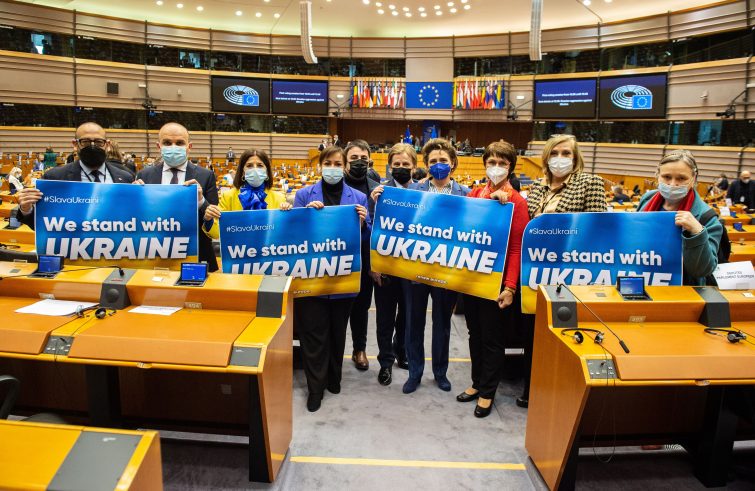
The European Union extends its friendly hand to Ukraine – while Putin is bombing houses, schools, public buildings. “Yesterday, 16 Ukrainian children were killed, yet Putin refers to military targets”, said Volodymyr Zelenskyy, President of the Ukrainian Republic, in a livestreamed video address to the extraordinary Plenary Session of the European Parliament in Brussels. The debate confirmed the unanimous support of the EU-27 to Kyiv, its institutions and the people of Ukraine, whilst condemning the unjustified attack by the Russian army. EU lawmakers agreed that the war was sparked off by an unbridled dictator who has become a global threat.
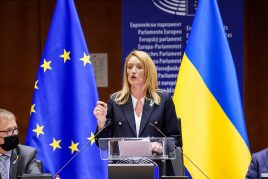 “Existential threat to Europe.” “On behalf of the European Parliament, I condemn the Russian military aggression against Ukraine in the strongest possible terms and express my solidarity with all those suffering and all those killed.” With these words, the President of the European Parliament Roberta Metsola introduced the plenary session before giving the floor to Ukrainian President Zelenskyy. “We will stand up. We will not look away. Putin will have to answer” for his deeds. “We are facing an existential threat to the Europe”, she said, praising the “courage of the Ukrainians.” She then mentioned Kiev’s request to join the EU: “We will work towards that goal. We must face the future together.”
“Existential threat to Europe.” “On behalf of the European Parliament, I condemn the Russian military aggression against Ukraine in the strongest possible terms and express my solidarity with all those suffering and all those killed.” With these words, the President of the European Parliament Roberta Metsola introduced the plenary session before giving the floor to Ukrainian President Zelenskyy. “We will stand up. We will not look away. Putin will have to answer” for his deeds. “We are facing an existential threat to the Europe”, she said, praising the “courage of the Ukrainians.” She then mentioned Kiev’s request to join the EU: “We will work towards that goal. We must face the future together.”
 “We defend civilisation.” “Do prove that you are with us. Do prove that you will not let us go, and then life will win over darkness”: said Volodymyr Zelenskyy in the concluding remarks at the extraordinary plenary of the European Parliament. Interrupted by several rounds of applause from the EU Chamber, the Ukrainian President, video-linked from Kyiv, appeared tried but determined to continue guiding the country under Russian and Belarusian attack. “I am pleased to acknowledge the unity of European countries, but I did not know that it was necessary to pay this very high price.” Zelenskyy described the domestic plight: “thousands of people were killed after five days of military invasion” by Russia. “People are being killed here. We are sacrificing our lives for values, for freedom, for the desire to be free. I am convinced that we will get through this.” Similarly, Ruslan Stefanchuk, Ukrainian parliament speaker, asked the EU not to abandon Ukraine and persevere in its economic sanctions. “We are defending the borders of Europe and of civilisation,” said the president of Kyiv’s parliament.
“We defend civilisation.” “Do prove that you are with us. Do prove that you will not let us go, and then life will win over darkness”: said Volodymyr Zelenskyy in the concluding remarks at the extraordinary plenary of the European Parliament. Interrupted by several rounds of applause from the EU Chamber, the Ukrainian President, video-linked from Kyiv, appeared tried but determined to continue guiding the country under Russian and Belarusian attack. “I am pleased to acknowledge the unity of European countries, but I did not know that it was necessary to pay this very high price.” Zelenskyy described the domestic plight: “thousands of people were killed after five days of military invasion” by Russia. “People are being killed here. We are sacrificing our lives for values, for freedom, for the desire to be free. I am convinced that we will get through this.” Similarly, Ruslan Stefanchuk, Ukrainian parliament speaker, asked the EU not to abandon Ukraine and persevere in its economic sanctions. “We are defending the borders of Europe and of civilisation,” said the president of Kyiv’s parliament.
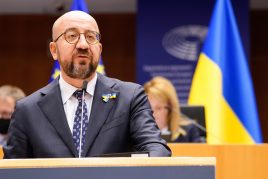 Geopolitical terrorism. “It is not only Ukraine that is under attack. International law, rules-based international order, democracy and human dignity are also under attack.” European Council President Charles Michel, addressing the assembly, said the Russian attack was “geopolitical terrorism pure and simple.” “Once again, war and bloodshed are being seen on European soil. Vladimir Putin launched a brutal, massive invasion of Ukraine, an unjustified war. And he did it for one reason only. Because in Maidan, you, dear Volodymyr Zelenskyy, and you, dear people of Ukraine, you made the choice of freedom, democracy and rule of law” Michel said. The President of the European Council went on to comment on the Kyiv government’s request for EU candidate status: “Ukraine wants to be part of Europe, and it is up to us Europeans to rise to the occasion. We understand that this is a complex issue, because it concerns enlargement” to the East. Moreover, “there are different points of view among EU Member States.” It is therefore up to “the European Commission to express an opinion on which the Council will assume its responsibility. It will have to assess the strong and, I believe, legitimate political request which has been made in an honest way, providing guidelines for making the right choice.”
Geopolitical terrorism. “It is not only Ukraine that is under attack. International law, rules-based international order, democracy and human dignity are also under attack.” European Council President Charles Michel, addressing the assembly, said the Russian attack was “geopolitical terrorism pure and simple.” “Once again, war and bloodshed are being seen on European soil. Vladimir Putin launched a brutal, massive invasion of Ukraine, an unjustified war. And he did it for one reason only. Because in Maidan, you, dear Volodymyr Zelenskyy, and you, dear people of Ukraine, you made the choice of freedom, democracy and rule of law” Michel said. The President of the European Council went on to comment on the Kyiv government’s request for EU candidate status: “Ukraine wants to be part of Europe, and it is up to us Europeans to rise to the occasion. We understand that this is a complex issue, because it concerns enlargement” to the East. Moreover, “there are different points of view among EU Member States.” It is therefore up to “the European Commission to express an opinion on which the Council will assume its responsibility. It will have to assess the strong and, I believe, legitimate political request which has been made in an honest way, providing guidelines for making the right choice.”
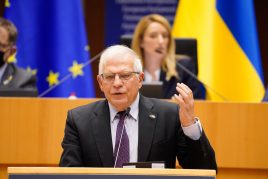 The gas issue. “This is a moment in which geopolitical Europe is being born”, said Josep Borrell, High Representative of the European Union for Foreign Affairs and Security Policy, pointing out that geopolitical Europe “comes into being at a time when we are confronted by threats, when Europe must face up to its responsibilities. For the first time since the Second World War, a country is invading another country. And this country” – Russia – “has nuclear weapons, thereby strengthening its capacity for intimidation.” In his lengthy speech, Borrell declared that “the EU must take rapid steps to eliminate its dependence on Russian gas”, also because “the European Union does not exchange human rights with gas, nor will we compromise on defending our freedoms and respect for human rights.” Borrell went on to point out that half of Russian central bank reserves are beyond Moscow’s control; the assets “are frozen, revealing a coercive capacity impossible to conceive of until three days ago.” In his view, “Russian citizens are starting to suffer the consequences of inflation and are assessing the collapse of their currency.”
The gas issue. “This is a moment in which geopolitical Europe is being born”, said Josep Borrell, High Representative of the European Union for Foreign Affairs and Security Policy, pointing out that geopolitical Europe “comes into being at a time when we are confronted by threats, when Europe must face up to its responsibilities. For the first time since the Second World War, a country is invading another country. And this country” – Russia – “has nuclear weapons, thereby strengthening its capacity for intimidation.” In his lengthy speech, Borrell declared that “the EU must take rapid steps to eliminate its dependence on Russian gas”, also because “the European Union does not exchange human rights with gas, nor will we compromise on defending our freedoms and respect for human rights.” Borrell went on to point out that half of Russian central bank reserves are beyond Moscow’s control; the assets “are frozen, revealing a coercive capacity impossible to conceive of until three days ago.” In his view, “Russian citizens are starting to suffer the consequences of inflation and are assessing the collapse of their currency.”
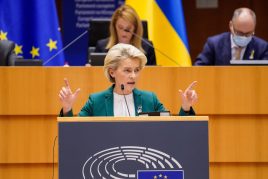 “There is another Russia.” The missiles fired at a number of Ukrainian cities, the plight of the oppressed population, people fleeing to Poland, Slovakia and Hungary… These were repeatedly mentioned issues at the European Parliament in Brussels. Surely, the extraordinary Plenary Session of the European Parliament will not stop the war in the immediate future, but it nevertheless confirmed that the EU has explicitly and unanimously decided to stand at the side of Ukraine. In her address, EU Commission President Ursula von der Leyen said: “President Putin decided that Ukraine has no right to exist. We will never accept that.” “We stay united and we will stand up in this war. How we respond today to what Russia is doing will determine the future of the international system. The destiny of Ukraine is at stake, but our own fate also lies in the balance.” The speech of the President of the Commission focused on the measures adopted to help the Ukrainian people and those decided to thwart Russia’s war and economy. She thus declared: “We are welcoming Ukrainians freeing from Putin’s bombs.” And this is why “we are proposing to activate the temporary protection mechanism to provide them with a secure status and access to schools, medical care and work.” “The EU has adopted the largest sanctions package in our Union’s history”, she remarked. “I am well aware that these sanctions will come at a cost for our economy, too. But I believe that the people of Europe understand very well that we must stand up against this cruel aggression.” Ursula Von der Leyen commented on what is happening in several cities in the Russian Federation: people “are marching for peace and freedom. And how does the Kremlin respond to this? By arresting thousands of them. There is another Russia besides Putin’s tanks. And we extend our hand of friendship to this other Russia. Be assured, they have our support.”
“There is another Russia.” The missiles fired at a number of Ukrainian cities, the plight of the oppressed population, people fleeing to Poland, Slovakia and Hungary… These were repeatedly mentioned issues at the European Parliament in Brussels. Surely, the extraordinary Plenary Session of the European Parliament will not stop the war in the immediate future, but it nevertheless confirmed that the EU has explicitly and unanimously decided to stand at the side of Ukraine. In her address, EU Commission President Ursula von der Leyen said: “President Putin decided that Ukraine has no right to exist. We will never accept that.” “We stay united and we will stand up in this war. How we respond today to what Russia is doing will determine the future of the international system. The destiny of Ukraine is at stake, but our own fate also lies in the balance.” The speech of the President of the Commission focused on the measures adopted to help the Ukrainian people and those decided to thwart Russia’s war and economy. She thus declared: “We are welcoming Ukrainians freeing from Putin’s bombs.” And this is why “we are proposing to activate the temporary protection mechanism to provide them with a secure status and access to schools, medical care and work.” “The EU has adopted the largest sanctions package in our Union’s history”, she remarked. “I am well aware that these sanctions will come at a cost for our economy, too. But I believe that the people of Europe understand very well that we must stand up against this cruel aggression.” Ursula Von der Leyen commented on what is happening in several cities in the Russian Federation: people “are marching for peace and freedom. And how does the Kremlin respond to this? By arresting thousands of them. There is another Russia besides Putin’s tanks. And we extend our hand of friendship to this other Russia. Be assured, they have our support.”
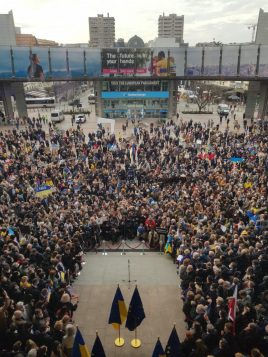 Parliament’s resolution. After the speeches of EU representatives and Ukrainian political leaders, the debate continued among MEPs, with many of them taking the floor. Parliament voted on a political resolution “calling on the EU institutions to work towards granting EU candidate status to Ukraine, in line with Article 49 of the Treaty on European Union and on the basis of merit, and, in the meantime, to continue to work towards its integration into the EU single market along the lines of the Association Agreement.” The resolution has been signed by all the political groups in the hemicycle ( People’ s Party, Socialists & Democrats, Renew/Liberal Democrats, the Greens, Conservatives, the Left), except for the Identity & Democracy Group, i.e. the nationalists, several of whom have professed friendship to Putin in the past. A rally in support of Ukraine took place in Brussels in the afternoon outside the Parliament building.
Parliament’s resolution. After the speeches of EU representatives and Ukrainian political leaders, the debate continued among MEPs, with many of them taking the floor. Parliament voted on a political resolution “calling on the EU institutions to work towards granting EU candidate status to Ukraine, in line with Article 49 of the Treaty on European Union and on the basis of merit, and, in the meantime, to continue to work towards its integration into the EU single market along the lines of the Association Agreement.” The resolution has been signed by all the political groups in the hemicycle ( People’ s Party, Socialists & Democrats, Renew/Liberal Democrats, the Greens, Conservatives, the Left), except for the Identity & Democracy Group, i.e. the nationalists, several of whom have professed friendship to Putin in the past. A rally in support of Ukraine took place in Brussels in the afternoon outside the Parliament building.











